Gardener White City: Cultivating Green Spaces in the Heart of the City
Introduction to Gardening in White City
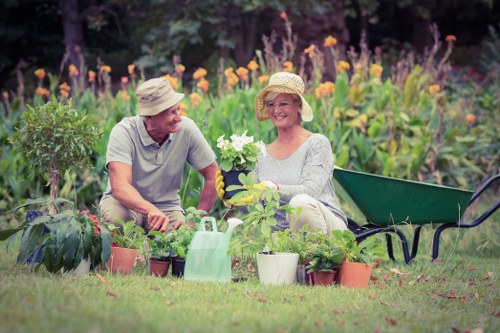
White City, known for its vibrant urban landscape and cultural landmarks, offers a unique environment for gardening enthusiasts. Whether you're a seasoned gardener or a beginner looking to green your balcony, White City provides ample opportunities to cultivate beautiful and sustainable green spaces.
With the increasing demand for eco-friendly living, gardening in White City not only enhances the aesthetic appeal of your surroundings but also contributes to a healthier environment. This guide explores the best practices, suitable plants, and local resources available for gardeners in White City.
Understanding the local climate, soil conditions, and available gardening spaces is crucial for successful gardening. White City's mix of residential areas, community gardens, and public parks offers diverse options for gardening projects of all sizes.
Choosing the Right Plants for White City
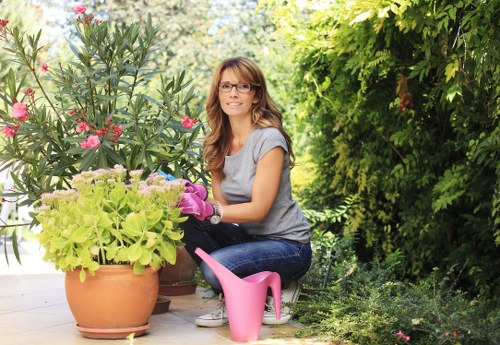
Selecting plants that thrive in White City's climate is essential for a flourishing garden. The region experiences a temperate climate with moderate rainfall, making it conducive for a wide variety of plants.
Consider planting native species that are well-adapted to the local environment. Native plants require less maintenance, are more resistant to pests, and support local wildlife, enhancing the biodiversity of White City.
Some popular choices include lavender, hydrangeas, and ornamental grasses. These plants not only add color and texture to your garden but also require minimal upkeep, making them ideal for busy urban gardeners.
Essential Gardening Tools for Urban Spaces
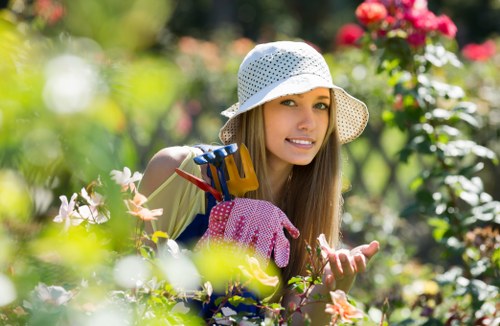
Gardening in an urban setting like White City often means working with limited space. As such, having the right tools can make all the difference in maintaining a tidy and productive garden.
Essential tools include a good quality trowel, pruning shears, watering cans, and a sturdy pair of gloves. Investing in these basic tools will help you manage your garden effectively, whether you're tending to a balcony garden or a community plot.
Additionally, consider space-saving solutions like vertical planters and compact storage options to keep your gardening tools organized and easily accessible.
Soil and Composting in White City
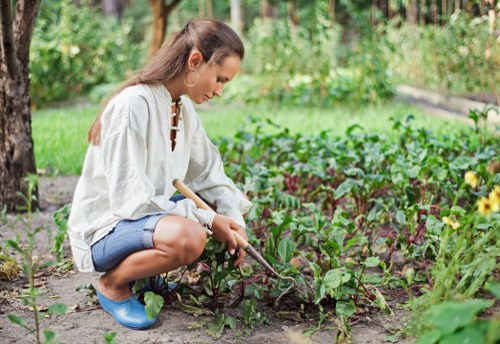
Healthy soil is the foundation of any successful garden. In White City, understanding soil composition and using compost can significantly improve plant health and yield.
Test your soil's pH and nutrient levels to determine what amendments are needed. Incorporating organic matter, such as compost or well-rotted manure, can enhance soil structure, moisture retention, and fertility.
Composting not only recycles kitchen waste but also provides rich nutrients for your plants. Consider setting up a compost bin in your garden or using community composting facilities available in White City.
Watering Strategies for Urban Gardens
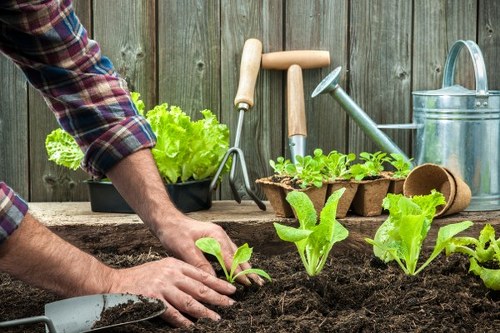
Efficient watering is crucial in maintaining a healthy garden, especially in an urban environment where water conservation is important. Implementing smart watering strategies can help you use water effectively without compromising plant health.
Drip irrigation systems are highly recommended for White City gardens. They deliver water directly to the plant roots, reducing evaporation and ensuring that plants receive the right amount of moisture.
Additionally, watering in the early morning or late evening minimizes water loss and prevents the growth of mold and mildew. Mulching around plants can also help retain soil moisture and reduce the need for frequent watering.
Creating Sustainable Gardens in White City

Sustainability is at the heart of modern gardening practices. In White City, creating a sustainable garden involves using eco-friendly techniques that promote environmental health and resource conservation.
Start by choosing plants that are native or well-suited to the local climate, as they require fewer resources and are more resilient to pests and diseases. Implementing rainwater harvesting systems can help reduce your water usage and provide a reliable source of moisture for your plants.
Additionally, using organic fertilizers and pesticides minimizes the impact on beneficial insects and the broader ecosystem. Composting garden waste also plays a crucial role in maintaining soil health and reducing landfill contributions.
Utilizing Community Gardens in White City

Community gardens are a fantastic resource for gardeners in White City, offering shared spaces where individuals can cultivate their own plots. These gardens foster a sense of community, provide access to fresh produce, and promote sustainable gardening practices.
Joining a community garden allows you to connect with other gardening enthusiasts, share tips and resources, and participate in collective maintenance efforts. It's an excellent way to enhance your gardening skills while contributing to the local green space.
Many community gardens in White City also host workshops and events focused on various aspects of gardening, from organic practices to urban farming techniques, providing continuous learning opportunities.
Seasonal Gardening Tips for White City

Adapting your gardening practices to the changing seasons ensures that your garden remains vibrant and healthy year-round. Each season in White City presents unique challenges and opportunities for gardeners.
In spring, focus on planting new seeds and preparing your garden beds. Summer requires diligent watering and pest management, while autumn is ideal for harvesting and preparing plants for the colder months.
Winter gardening involves protecting plants from frost and planning for the upcoming gardening season. Utilizing seasonal compost and mulching can help your garden withstand temperature fluctuations and maintain soil integrity.
Local Resources and Support for Gardeners

White City offers a wealth of resources to support local gardeners, from nurseries and garden centers to online communities and support groups. Accessing these resources can enhance your gardening experience and provide valuable assistance when needed.
Local nurseries in White City stock a variety of plants suited to the area's climate, as well as gardening tools and supplies. Many also offer expert advice and personalized recommendations to help you select the best plants for your garden.
Additionally, online forums and social media groups dedicated to White City gardening foster a supportive community where you can ask questions, share successes, and learn from fellow gardeners.
10-15 Nearby Areas to White City for Gardening Enthusiasts
- Earls Court - Just west of White City, known for its beautiful parks and ornamental gardens.
- Shepherd's Bush - Offers community gardens and green spaces ideal for urban gardening projects.
- Kensington - Home to the Royal Gardens, providing inspiration and botanical diversity.
- Hammersmith - Features several public gardens and nurseries for gardening supplies.
- Paddington - Known for its rooftop gardens and innovative urban farming initiatives.
- Maida Vale - Offers peaceful garden spaces and community-supported agriculture programs.
- Notting Hill - Famous for its colorful gardens and vibrant plant markets.
- Westbourne Park - Provides spacious gardens and local gardening clubs.
- Queen's Park - Features extensive green areas perfect for family gardening activities.
- Ladbroke Grove - Offers access to community-supported gardens and eco-friendly gardening workshops.
- Littlegate - Known for its botanical gardens and seasonal plant exhibitions.
- Acton - Provides numerous community gardens and sustainable gardening resources.
- Goldhawk Road - Features local plant shops and garden supply stores.
- White City Estates - Close proximity to White City's central gardens and green initiatives.
- Sloane Square - Offers luxurious garden centers and high-end plant nurseries.
Maintaining Your Garden: Best Practices

Proper maintenance is key to ensuring your garden remains healthy and beautiful throughout the year. Regular upkeep not only enhances the aesthetic appeal but also promotes the longevity of your plants.
Key maintenance practices include pruning, weeding, and fertilizing. Pruning helps shape plants and encourages healthy growth, while weeding prevents competition for nutrients and water. Regular fertilization provides essential nutrients that may be lacking in the soil.
Additionally, monitoring your garden for pests and diseases allows for early intervention, preventing widespread issues. Implementing natural pest control methods, such as introducing beneficial insects, can help maintain a balanced ecosystem in your garden.
Gardening for Mental Health in White City

Gardening is not only beneficial for the environment but also has significant positive effects on mental health. In the bustling urban setting of White City, gardening provides a peaceful retreat and a therapeutic pastime.
Tending to plants can reduce stress, improve mood, and increase feelings of accomplishment. The act of nurturing a garden fosters a sense of responsibility and connection to nature, which can be especially valuable in a city environment.
Community gardens also offer social benefits, allowing individuals to connect with neighbors and build a supportive network. Engaging in gardening activities can enhance overall well-being and contribute to a more balanced lifestyle.
Innovative Gardening Techniques in White City

Embracing innovative gardening techniques can elevate your gardening experience and yield impressive results. In White City, where space may be limited, creative approaches to gardening can maximize productivity and aesthetic appeal.
Vertical gardening is a popular technique that involves growing plants upwards using trellises, shelves, or wall-mounted planters. This method is ideal for small spaces and can transform blank walls into green living spaces.
Hydroponics and aquaponics are advanced gardening systems that allow for soil-free cultivation. These methods use nutrient-rich water solutions and can significantly increase plant growth rates, making them suitable for urban environments where traditional gardening may be challenging.
Conclusion: Embracing the Green Movement in White City

Gardening in White City is a rewarding endeavor that combines aesthetic beauty with environmental stewardship. By selecting the right plants, utilizing sustainable practices, and leveraging local resources, you can create a thriving garden that enhances both your living space and the community.
Whether you're cultivating a small balcony garden or participating in a community plot, the opportunities for green living in White City are abundant. Embrace the gardening journey and contribute to a greener, healthier urban environment.
Remember, the key to successful gardening lies in continuous learning and adaptation. Stay informed about the latest gardening trends and techniques, and don't hesitate to reach out to local gardening groups for support and inspiration.
Frequently Asked Questions
- What are the best plants for beginners in White City?
Some of the best plants for beginners include herbs like basil and mint, easy-care flowers like marigolds and petunias, and resilient vegetables such as lettuce and tomatoes.
- How can I conserve water in my White City garden?
Implementing drip irrigation systems, using mulch to retain soil moisture, and selecting drought-resistant plants are effective ways to conserve water in your garden.
- Are there community gardens available in White City?
Yes, White City has several community gardens where residents can rent plots, collaborate with fellow gardeners, and access shared resources and tools.
- What resources are available for sustainable gardening practices?
Local nurseries, gardening clubs, online forums, and workshops offer valuable information and resources for sustainable gardening, including composting, organic pest control, and native plant selection.
- How can I protect my garden from urban pests?
Using natural pest repellents, introducing beneficial insects, and maintaining proper garden hygiene are effective strategies to protect your garden from urban pests.